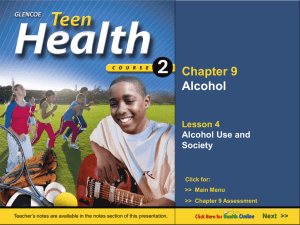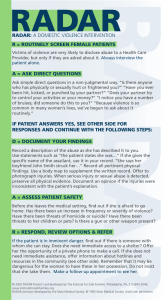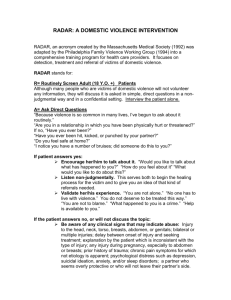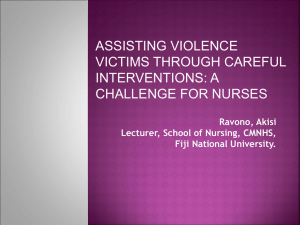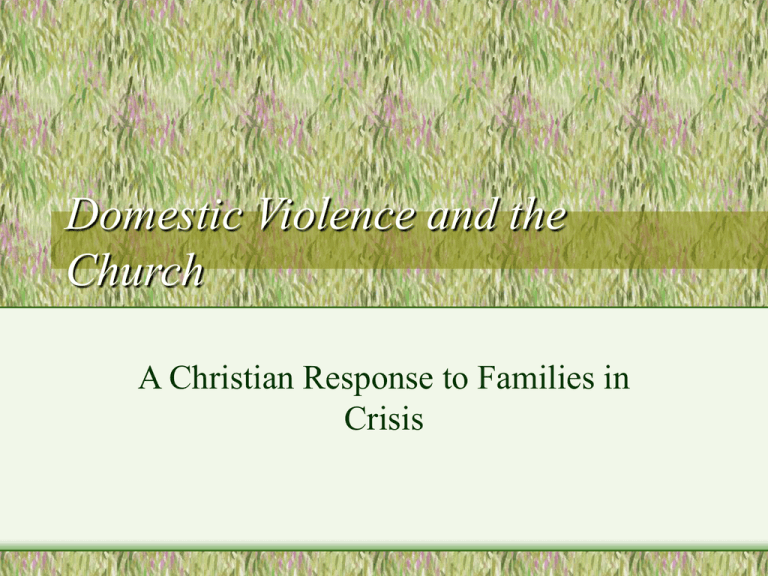
Domestic Violence and the
Church
A Christian Response to Families in
Crisis
Overview of Domestic Violence
Domestic Violence is
any kind of behavior
that a person uses to
control an intimate
partner through fear
and intimidation.
Types of Abuse:
•
•
•
•
•
•
Physical
Sexual
Psychological
Verbal
Economic
Spiritual
Statistics
Calgary Police Service
51%
· Responded to 10,385
domestic violence - related
calls in 2000;
49%
· Reported that children were
present at 49% of all
domestic incidents
responded to by the Calgary
Police Service in 1999.
Children Present
Children Absent
Statistics
Statistics Canada Incident Based Uniform Crime Reporting Survey (2000)
•
•
Victims of spousal violence
represented 18% of all victims of
violent offences.
Women accounted for 85% of the
victims of spousal violence;
Common Assault
•
•
•
•
Includes 63% of female victims
Includes 59% of male victims
Least serious form of assault outlined
in the Criminal Code of Canada.
Includes pushing, slapping, punching
and face to face verbal threats.
Spousal Violence 15%
Male
Common Assault
Other
Female
Frequency of Common
Assault - Males
85%
Common Assault
Other
Frequency of Common
Assault- Females
Statistics
Statistics Canada Violence Against
Women Survey (1993)
•
Three in ten married women had been
physically or sexually assaulted at
least once.
•
Two thirds of victims had been
victimized more than ten times;
•
One in five victims did not ask for
any help.
•
On average, women are assaulted 35
times before contacting the police.
The Three Goals of Intervention
• Safety for the victim and children.
• Accountability for the abuser.
• Restoration of the relationship (if possible)
or mourning of the loss of the relationship.
Critical Questions
Taken from No Place for Abuse by Catherine Clark Kroeger
and Nancy Naeson Clark by permission of Inter Varsity Press
SAFETY
• Are you frightened to return home?
• Do you feel in danger? In what way?
• Have you ever called the police, or considered calling the police?
TEMPORARY REFUGE
• Do you have somewhere you can go with your children if you
cannot go home or must flee in a hurry?
• Do you know about the local shelter and its services?
• Do you have a way to get there if you need to?
Critical Questions
Taken from No Place for Abuse by Catherine Clark Kroeger
and Nancy Naeson Clark by permission of Inter Varsity Press
CHILDREN
• What concerns do you have about the safety or welfare of your
children?
SUPPORT
• Do you have people you can turn to when you feel you need to
share what is going on in your life?
• If you had an appointment with your doctor, a counselor, or a
lawyer, is there someone you could ask to come with you?
Critical Questions
Taken from No Place for Abuse by Catherine Clark Kroeger
and Nancy Naeson Clark by permission of Inter Varsity Press
PRACTICAL HELP
• Are there any day to day tasks that are difficult for you to get
done right now?
• Do you have access to a car or transportation?
• Is there someone you could leave your children with if you
needed to be free of childcare responsibilities for a few hours?
SPIRITUAL HELP
• Have you thought about how our faith community could be
helpful at this difficult point in your life?
• Are there any spiritual needs that you wish someone could help
you with right now?
Critical Questions
Taken from No Place for Abuse by Catherine Clark Kroeger
and Nancy Naeson Clark by permission of Inter Varsity Press
PROFESSIONAL HELP
• Do you know whom to contact if you need legal help or a
doctor’s care?
• If you wanted help from a professional therapist, would you
know how to get it?
IMMEDIATE NEEDS
• Have you thought of developing a safety plan (important
documents copied, extra cash, telephone numbers of agencies or
contacts, spare keys) in case you need to leave your home very
quickly?
• Can I help connect you to those in our community that are
trained to help people coping with life crises?
Misconceptions About Church
Teachings and Scripture
“Abuse is my cross to bear.”
- Jesus chose His cross, and He bore it for our sake. A woman
does not choose to be abused, and no one is “helped” in
any way by her being abused.
Misconceptions About Church
Teachings and Scripture
“I can’t leave my abusive spouse, because the
Church teaches that that is a sin.”
- A spouse who occasions grave danger of soul or body to the
other or to the children, or otherwise makes the common
life unduly difficult, provides the other spouse with a
reason to leave, either by a decree of the local Ordinary or,
if there is danger in delay, even on his or her own
authority.
(Canon Law 1153 §1)
Misconceptions About Church
Teachings and Scripture
“The Bible says I have to submit to my husband.
(Eph. 5:22)”
- Reading the whole passage (Eph. 5:21-33), we see that
wives and husbands must submit to each other equally, and
that husbands must treat their wives with love and respect.
(Eph. 5:33)
Misconceptions About Church
Teachings and Scripture
“The Bible says I have to forgive my abuser.
6:9-15)”
(Mt.
- Forgiveness is not permission to repeat the offence, nor does
it mean that we must expose ourselves to danger. Rather, it
allows us to let go of a bad experience and move on with
our lives, in recognition that we do not need to tolerate
abuse against ourselves or others.
Misconceptions About Church
Teachings and Scripture
“This is God’s way of punishing me for something I
did in the past.”
- Our God loves us very much, and forgives us of our past
sins when we ask Him. He does not use the circumstances
of our lives to punish us. Jesus helped, forgave, and healed
many women during His ministry on earth. (Mk. 5:25-34,
Jn. 8:1-11, Lk. 7:36-50)
Misconceptions About Church
Teachings and Scripture
“My priest will probably side with my husband, so
there is no point asking for help.”
- Priests should be trained to recognize and deal with
domestic violence situations. Your Church can put you in
touch with resources such as Catholic counseling, safe
houses, emergency assistance, and other valuable
resources. If you are not receiving the help you need, keep
on trying.
24 Hour Help
•
•
•
•
•
•
•
•
•
•
•
•
•
Emergency: Police, Fire, Ambulance - 911
Requests for Police Service - 266-1234
Community Resource Team - 299-9699
Kerby Rotary House - 705-3250
Calgary Women’s Emergency Shelter - 232-8717
Awo Taan Native Women’s Shelter - 531-1972
YWCA Family Violence Prevention Centre/ Sheriff King Home - 266-0707
Calgary Communities Against Sexual Abuse - 237-5888
Distress Centre - 266-1605
Men’s Line - 266-4357
Child Abuse - 270-5333
Children’s Cottage - 233-2273
Discovery House - 670-0467





